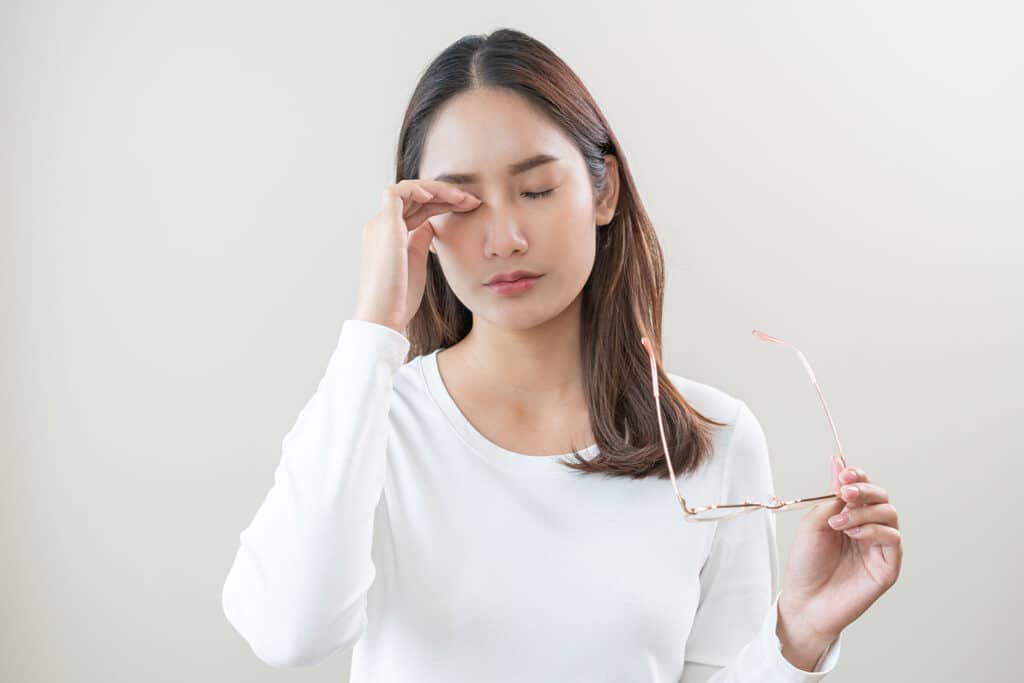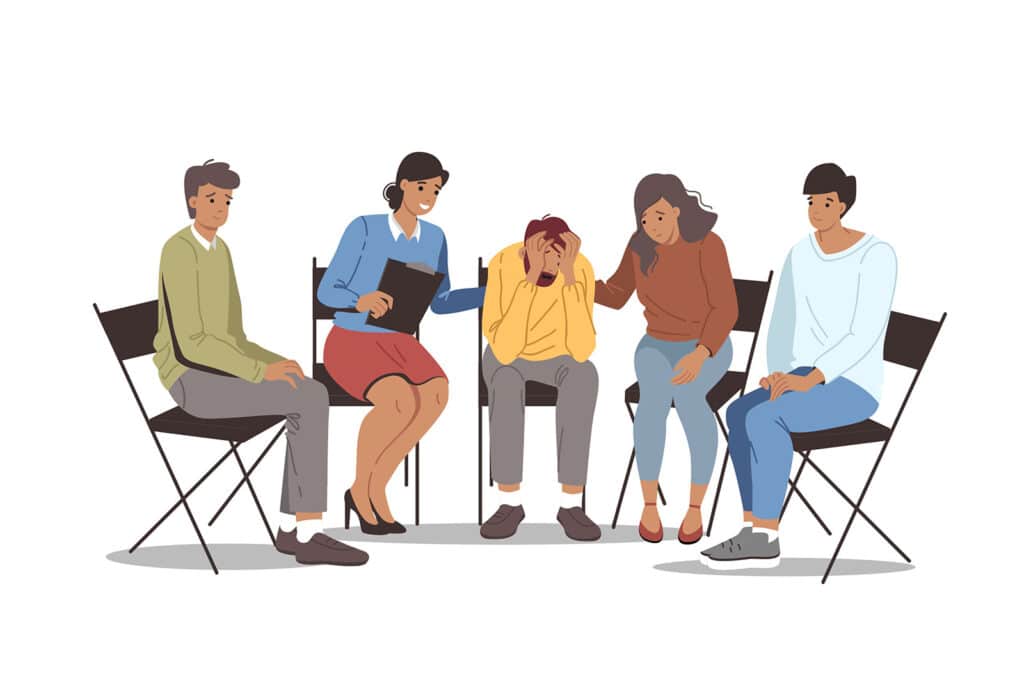Ever woken up after a night of drinking with blurry vision? While that temporary haziness typically clears up, regular heavy drinking can actually lead to serious, long-term eye problems.
Many people don’t realize that alcohol consumption affects more than just your liver. It can significantly impact your eye health and vision quality too.
Alcohol drinkers face everything from temporary double vision after a few drinks to potentially permanent damage from long-term heavy drinking.
In this article, we explore how drinking impacts your vision in both the short and long term, and what you can do to protect your eye health.

Table of Contents
How Does Drinking Affect Eyesight?
Even occasional or moderate drinking can temporarily impact your vision and eye health. While the following effects typically resolve once alcohol leaves your system, they’re worth understanding—especially if you notice your vision changes after having a few drinks.
Alcohol’s Short-Term Effects on Eye Health
- Blurred Vision: Alcohol slows down the communication between your brain and eyes, making it harder to focus. This is why objects might appear fuzzy or unclear after a few drinks.
- Double Vision (Diplopia): Your eye muscles may not coordinate properly under alcohol’s influence. It causes you to see two images instead of one.
- Delayed Reaction Time: Alcohol slows your pupil’s response to light changes. This means your eyes take longer to adjust when moving from bright to dark environments, and vice versa.
- Decreased Peripheral Vision: Your ability to see objects at the edges of your visual field may temporarily diminish, creating a mild “tunnel vision” effect.
- Bloodshot Eyes: Alcohol dilates blood vessels, including those in your eyes, giving them that characteristic red appearance.
- Dry Eyes: As a diuretic, alcohol can contribute to dehydration. It reduces tear production and causes eye dryness and irritation.
Factors That Might Contribute to Stronger Effects
Not everyone will experience the above side effects after one or two glasses of alcohol. So, what does it depend on? Below are some factors that might worsen how you feel after you’re done drinking:
- Hydration Levels: Being dehydrated before drinking can intensify vision effects.
- Individual Tolerance: Your typical alcohol consumption patterns affect how strongly these symptoms present.
- Medication Interactions: Some medications can enhance alcohol’s effects on vision when combined. Make sure to check prescription labels closely.
- Existing Eye Condition: People with pre-existing eye issues may experience more pronounced symptoms. If you already have poor eyesight or cataracts, it’s best to abstain from drinking.
- Amount Consumed: The more alcohol consumed, the more significant the visual disruptions will typically be.
- Consumption Speed: Drinking quickly doesn’t give your body time to process alcohol, potentially intensifying eye effects.

How Does Alcoholism Affect Eyesight?
While occasional drinking causes temporary vision issues, long-term excessive alcohol consumption can lead to permanent eye damage.
Note: The National Institute on Alcohol Abuse and Alcoholism defines heavy drinking as consuming more than 5 drinks on any day or more than 15 drinks per week for men. For women, the NIAAA advises against drinking more than 4 drinks daily or 8 drinks weekly.
Signs you might be drinking at harmful levels include: needing more alcohol to feel the same effects, experiencing withdrawal symptoms, and continuing to drink despite negative consequences.
You might also notice your drinking interfering with responsibilities and loved ones expressing concern about your drinking habits. With that, alcohol abuse affects your eyesight in the following ways:
Optic Neuropathy
Heavy, prolonged alcohol consumption can damage the optic nerve, resulting in a condition called alcohol-related optic neuropathy. This serious eye condition causes progressive, painless vision loss, decreased color perception, and blind spots in your central vision.
The damage occurs partly because alcohol interferes with vitamin B1 (thiamine) absorption, which is essential for proper optic nerve function. Without timely intervention, this condition can lead to permanent vision impairment or even blindness.
Age-Related Macular Degeneration (AMD)
Research suggests heavy drinking accelerates the development of age-related macular degeneration (a leading cause of vision loss among older adults). AMD damages the macula—the central part of your retina responsible for sharp, detailed vision.
Long-term alcohol consumption increases oxidative stress in the eye and reduces important protective antioxidants. It creates an environment where macular degeneration can develop more rapidly. This leads to difficult reading, recognizing faces, and seeing fine details.
Increased Risk of Cataracts
Excessive alcohol consumption is linked to earlier development and faster progression of cataracts (i.e. clouding of the eye’s natural lens). Heavy drinking promotes oxidative stress and inflammation in the eye tissues. This accelerates protein changes in the lens that lead to cloudiness.
Studies show heavy drinkers may develop cataracts up to five years earlier than non-drinkers. Unlike some temporary vision effects, cataracts progressively worsen and typically require surgical intervention to restore clear vision.
Weakened Eye Muscles
Chronic alcohol abuse can lead to permanent damage to the eye muscles and the nerves that control them. Over time, this can result in various forms of strabismus (misaligned eyes) or nystagmus (involuntary eye movements).
These conditions cause persistent double vision, decreased depth perception, and eye strain that doesn’t resolve when sober. The brain’s attempt to compensate for these misalignments can trigger chronic headaches and further vision complications.
Dry Eye Syndrome
Long-term heavy drinking can contribute to chronic dry eye syndrome by affecting tear production and quality. Alcohol’s diuretic effect leads to ongoing dehydration, while its inflammatory properties irritate the eye’s surface.
The resulting insufficient tear film fails to properly lubricate and protect the eye. Chronic dry eyes cause persistent irritation, blurred vision, light sensitivity, and can eventually lead to corneal damage if left untreated.
Diabetic Retinopathy Acceleration
For people with diabetes, heavy alcohol consumption significantly accelerates the progression of diabetic retinopathy—a serious eye disease affecting blood vessels in the retina.
Alcohol increases blood sugar fluctuations and compromises blood vessel integrity. This causes faster development of retinal damage. It also leads to bleeding in the eye, vision distortions, and potentially retinal detachment.
The combined effects of diabetes and excessive alcohol create a particularly high risk of severe, permanent vision loss.
Decreased Peripheral Vision
Chronic heavy drinking can permanently reduce peripheral (side) vision through damage to the retina and optic nerve pathways. This creates a persistent tunnel vision effect where only central vision remains clear.
Peripheral vision loss makes daily activities, like driving or navigating crowded spaces, dangerous. This condition often develops gradually, with many people not noticing the change until significant vision has already been lost.
Note: Unlike temporary peripheral vision changes from occasional drinking, this damage typically doesn’t improve with sobriety.

How to Treat Alcohol-Related Vision Problems
When alcohol consumption has affected your vision, treatment approaches vary depending on whether the vision problems are temporary or permanent.
Working with healthcare providers who specialize in both eye care and substance use disorders often provides the best outcomes for recovery.
Addressing Temporary Vision Issues
For short-term vision problems caused by occasional drinking, the simplest treatment is time and hydration. Drinking plenty of water helps flush alcohol from your system and rehydrates your body, including your eyes.
Over-the-counter lubricating eye drops can relieve temporary dry eye symptoms and reduce bloodshot appearance. Getting adequate rest also allows your visual system to recover from alcohol’s effects.
Medical Interventions for Serious Conditions
More severe alcohol-related eye conditions, like optic neuropathy, require prompt medical attention. Treatment typically begins with complete abstinence from alcohol and nutritional therapy, particularly B-vitamin supplements to address deficiencies.
For conditions like cataracts, surgical removal, and lens replacement may be necessary. Advanced cases of macular degeneration might benefit from anti-VEGF injections that slow disease progression.
In all cases, earlier treatment leads to better outcomes and a greater chance of preserving vision.
Managing Chronic Dry Eye
For chronic dry eye, prescription eye drops that reduce inflammation or increase tear production may be recommended by your eye doctor.
For starters, omega-3 fatty acid supplements may improve tear quality. Additionally, environmental modifications, like using a humidifier and avoiding smoke or wind exposure, can also help manage symptoms.
Vision Rehab Programs
When alcohol has caused permanent vision damage, vision rehab programs can help maximize remaining sight and maintain independence. These specialized programs teach adaptive techniques and provide tools, like magnifiers, high-contrast reading materials, and text-to-speech tech.
Regular Eye Exams
Consistent eye care is crucial for anyone with a history of heavy drinking. Regular comprehensive eye exams can detect early signs of alcohol-related eye damage before symptoms become noticeable.
An ophthalmologist can monitor changes in vision, eye pressure, and retinal health, allowing for timely intervention.

Getting Help With Alcoholism Today
Our modern alcohol treatment programs offer comprehensive approaches tailored to individual needs. These include medical supervision for safe withdrawal and counseling to address underlying issues.
Additionally, our treatment centers provide both inpatient and outpatient options, so it’s possible to find a program that fits your life circumstances. Remember, addressing alcohol issues early can prevent or minimize permanent vision damage.
If you’re concerned about your drinking or a loved one’s alcohol consumption, take the first step today and reach out to one of our healthcare providers. Call us today!
Published on: 2025-04-22
Updated on: 2025-04-29



